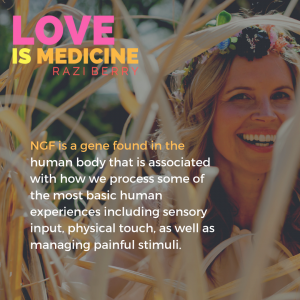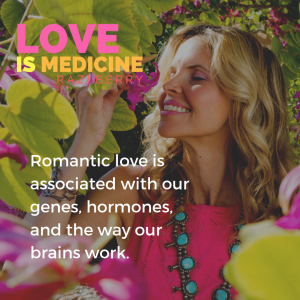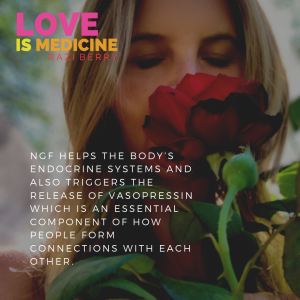Love has countless benefits for our physical, mental, emotional, and spiritual well-being. Among these benefits, love can help us to manage our sensory input, including to serve as somewhat of a pain reliever. Love is associated with NGF, a peptide that helps the body to manage basic physiological processes through the sympathetic and peripheral nervous systems. The sympathetic nervous system makes up part of the autonomic nervous system, also known as the involuntary nervous system. Without conscious direction, the autonomic nervous system regulates important bodily functions such as heart rate, blood pressure, metabolism, pupil body temperature, and digestion. It also manages the flight, fight or freeze response.
 NGF: The Sensory Management and Pain Relief Gene
NGF: The Sensory Management and Pain Relief Gene
Love is connected to many biological processes and neurological factors. One of the factors related to romantic love is the level of a gene known as nerve growth factor (NGF).
As noted above, romantic love, especially the type of love found in the early phase of a relationship is associated with high levels of nerve growth factor (NGF). NGF is a gene found in the human body that is associated with how we process some of the most basic human experiences including how we process sensory input like temperature, physical touch, as well as how we manage painful stimuli. Interestingly, when the NGF gene is abnormal it may cause a psychopathological syndrome known as hereditary sensory and autonomic neuropathy, a disorder that involves the inability to feel pain and sense the differences in temperatures including the degree to which something is hot or cold.
Receiving sensory messages is a critical aspect of our intuition
Our senses are the receivers of important information from the people, places and things all around us. Receiving sensory messages is a critical aspect of our intuition. Think of how your body responds with a “gut feeling” or a prickling on the back of the neck, a racing heart, or goose bumps. This helps us to just “know” things.
The common experience of love and our biological functioning of managing sensory input
This connection between the common experience of love and our biological functioning of managing sensory input (including pain) shows that love may be highly important for the survival of the species and highly beneficial for each individual as well. Romantic love is not just a feeling but it is essential to our existence as humans. Romantic love is associated with our genes, hormones, and the way our brains work.
NGF is a neurotrophic peptide, a protein that helps with the body’s effort to maintain survival and well-being of its nerves and internal systems. NGF helps the body to manage its instinct to ensure survival as well as to help the peripheral and central nervous system work effectively and efficiently. The nerves of the peripheral nervous system help the central nervous system (CNS) by connecting the CNS to the body’s sensory organs, such as the eyes and ears and other organs such as the muscles and blood vessels.
NGF helps body’s endocrine system and triggers release of vasopressin
NGF helps the body’s endocrine systems and also triggers the release of vasopressin which is an essential component of how people form connections with each other. NGF can trigger the release of vasopressin in the hypothalamus which is a part of the brain that helps with sensory integration and behaviors. Vasopressin helps us to form close relationships and connect with other people. It helps us to have and to show appropriate social skills and bond with other people. So, NGF can help us to form close bonds with other people, process the new experiences we have with them, and then act appropriately in situations that we encounter with that new individual.
NGF also helps the body to keep its endocrine system functioning well specifically by helping regulate molecules and hormones passed along through the system. The experience of romantic love is associated with the endocrine system, as well. The endocrine system is a system in the body that helps to maintain the body’s homeostasis, or balance, by helping the body to manage stress, including painful sensory input, emotional dysregulation, and many other functions that impact our physiological experience.
 Positive correlation: increased NGF levels would also be related to intensity of romantic love
Positive correlation: increased NGF levels would also be related to intensity of romantic love
With the positive correlation between NGF and the endocrine system as well as the positive correlation between romantic love and the endocrine system, it makes sense then that increased NGF levels would also be related to intensity of romantic love. The role NGF plays in endocrine functioning certainly helps us to manage stressful sensory input and manage physical or emotional pain and discomfort.
Since we know that the feeling of love often changes over time, that it is different from the early stage of a relationship as compared to when the relationship is one year or many years old, it is understandable that NGF levels would change with that change in how love is felt over time.
NGF levels are also connected to experiencing stress and anxiety. Sometimes, despite the pleasure and excitement in early romantic relationships, there can also be a bit of stress or anxiety that comes along with this type of relationship. Stress may be in the form of being worried about what to wear or how to act or what the other person may think of you. Anxiety may be in the form of feeling nervous about the impression you are making, wondering how the other person will respond to learning certain things about you, and many other scenarios.
NGF helps people to feel more comfortable with new relationships. In one way, NGF helps people to manage the new experiences of bonding with a new person. From a survival standpoint, it makes sense that the body would be hesitant about unfamiliar situations, unfamiliar people, and unfamiliar sensory input. However, connections with others are essential to having a fulfilling life as well as to ensuring that the human race continues through reproduction and nurturing of youth.
Taking on risk by approaching and interacting with someone new is essential to obtain great gains
Taking on the risk and possibility of pain by approaching and interacting with someone new is essential to obtain the great gains that can come from these relationships. However, the NGF gene also helps us to manage this risk and gives us the ability to effectively manage our emotions and behaviors in these new, often over-stimulating, social situations.
 NGF levels are likely related to intense emotional states
NGF levels are likely related to intense emotional states
NGF levels are likely related to intense emotional states like emotional dependency (specifically when one is dependent upon a romantic partner). NGF is also linked to feelings of euphoria or feelings of extreme happiness and excitement. Euphoria may be viewed as a general sense of intense positive well-being.
Interestingly, NGF levels tend to be higher in the brain of people in early romantic relationships (a romantic relationship up to six months long) as compared to people not in a relationship or people in a longer term relationship. It seems that the more intense the romantic love in the relationship, the higher levels of NGF seem to be present in the brain. This seems to suggest that when you are feeling an intensive romantic feeling toward someone, NGF has to kick in to help you to manage the emotional stimuli, sensory experiences, and possibility of risk (or pain) that can come from this highly attractive person and the potential relationship that you are imagining or currently in the midst of experiencing.
Romantic love, as it is experienced in the early stages of a relationship, also has the benefit of pain relief. The way that our bodies respond to our partners early on in a relationship is similar to an analgesic, or pain relieving, effect. NGF helps us to process sensory input. The sensory regulatory task of NGF helps us to manage the input we experience from our environment including processing of sounds, textures, temperature, and pain. NGF helps the body to manage the sensation of pain. This may be relevant in a new romantic relationship.
Protection and Preparation
The body needs to protect itself and prepare itself for potential threat of harm, whether that harm is in the form of emotional or physical pain. From a relational standpoint, NGF may need to assist with managing the new relationship to help you to maintain a strong bond while also balancing this intense longing for someone else with the ability to manage your emotions and behaviors effectively.
How stages of relationships impact NGF levels
NGF levels are higher in couples who are in the early stage of their relationship specifically that of a romantic love relationship. Not only is NGF associated with love, NGF is also associated with pain. As mentioned above, NGF helps the body to manage sensory input including to help a person to manage the experience of pain. Most people who have ever been in love know that love can also come with the risk of pain. This connection suggests that NGF, love, and pain are all interconnected. They are in fact all founded and experienced in the sympathetic nervous system of the body and primitive areas of the brain.
Experience of loving someone can help you to manage sensory overload
Isn’t it so amazing how the body has been designed to help us with the smallest and biggest events of our lives including that of developing a romantic relationship with a new partner. Loving someone activates higher levels of NGF, a protein in the body related to a gene known for its association with sensory regulation and pain relief. Not only does having someone to love feel pleasant, the experience of loving someone can also help you to manage sensory overload as and can help you with management of physical or emotional pain, as well.
References:
Aloe L, Rocco ML, Balzamino BO, Micera A. Nerve Growth Factor: A Focus on Neuroscience and Therapy.Curr Neuropharmacol. 2015 May;13(3):294-303. doi: 10.2174/1570159X13666150403231920. Epub 2015 May. PubMed PMID: 26411962; PubMed Central PMCID: PMC4812798.
Bear MH, Bollu PC. Neuroanatomy, Hypothalamus. [Updated 2019 Jan 13]. In: StatPearls [Internet]. Treasure Island (FL): StatPearls Publishing; 2019 Jan-. Available from:https://www.ncbi.nlm.nih.gov/books/NBK525993/
Chrousos GP. Organization and Integration of the Endocrine System.Sleep Med Clin. 2007 Jun;2(2):125-145. doi: 10.1016/j.jsmc.2007.04.004. PubMed PMID: 18516219; PubMed Central PMCID: PMC2128294.
Emanuele, E. (2011). NGF and Romantic Love. Archives Italiennes de Biologie, 149: 265-268.
NGF Gene: Nerve Growth Factor. Genetics Home Reference. National Institute of Health. U.S. National Library of Medicine. Published April 2nd, 2019. Retrieved on April 15, 2019 from https://ghr.nlm.nih.gov/gene/NGF#conditions.
Photo by Radu Florin on Unsplash
 Razi Berry is the founder and publisher of the journal Naturopathic Doctor News & Review, which has been in print since 2005, and the premier consumer-faced website of naturopathic medicine, NaturalPath. She is the host of The Natural Cancer Prevention Summit and The Heart Revolution-Heal, Empower and Follow Your Heart, and the popular 10 week Sugar Free Summer program. From a near death experience as a young girl that healed her failing heart, to later overcoming infertility and Chronic Fatigue Syndrome and Fibromyalgia through naturopathic medicine, Razi has lived the mind/body healing paradigm. Her projects uniquely capture the tradition and philosophy of naturopathy: The healing power of nature, the vital life force in every living thing and the undeniable role that science and mind/body medicine have in creating health and overcoming dis-ease. Follow Razi on Facebook at Razi Berry , join her Love is Medicine group to explore the convergence of love and health, and find more Love is Medicine podcast episodes here.
Razi Berry is the founder and publisher of the journal Naturopathic Doctor News & Review, which has been in print since 2005, and the premier consumer-faced website of naturopathic medicine, NaturalPath. She is the host of The Natural Cancer Prevention Summit and The Heart Revolution-Heal, Empower and Follow Your Heart, and the popular 10 week Sugar Free Summer program. From a near death experience as a young girl that healed her failing heart, to later overcoming infertility and Chronic Fatigue Syndrome and Fibromyalgia through naturopathic medicine, Razi has lived the mind/body healing paradigm. Her projects uniquely capture the tradition and philosophy of naturopathy: The healing power of nature, the vital life force in every living thing and the undeniable role that science and mind/body medicine have in creating health and overcoming dis-ease. Follow Razi on Facebook at Razi Berry , join her Love is Medicine group to explore the convergence of love and health, and find more Love is Medicine podcast episodes here.

















